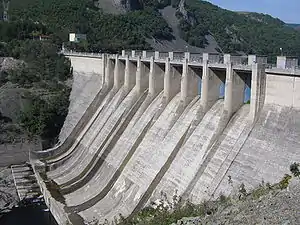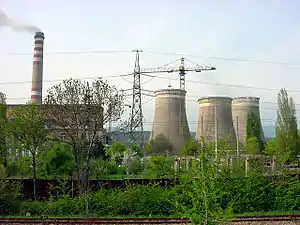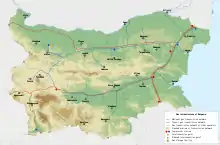Energy in Bulgaria
About 200 TWh of energy in Bulgaria is consumed each year which is about 28 MWh per person, somewhat over the world average of 20 MWh.[1] The largest sources are coal and oil, followed by nuclear.[2]

Although Bulgaria is not very rich in fossil fuels such as coal, oil and gas, it has very well developed energy sector which is of crucial importance for the Balkans and the whole South Eastern Europe. Nuclear power produces 36% of Bulgaria's power. Bulgaria is a major producer and exporter of electricity in the region and plays an important role in the energy balance on the Balkans. It produces almost no oil, however, and is heavily dependent on imports for crude oil. Most of Bulgaria's energy is produced from fossil fuels, almost twice the amount of hydropower or nuclear energy.[3]
Economics
To improve the corporate management and supervision of the energy sector, on 13 February 2008 the Government of Bulgaria decided to set up a state-owned energy holding company Bulgarian Energy Holding, a successor of the state-owned 'Neft i Gas' (Oil and Gas) established in 1973. The holding company's business composes of subsidiaries operating in different energy sectors: electricity: Kozloduy nuclear power plant, Maritsa East 2 thermal power plant, NEK EAD and Elektroenergien sistemen operator (ESO); natural gas: Bulgargaz and Bulgartransgaz; coal mining: Mini Maritsa Iztok (Maritsa East mines). The state holds a 100% stake in the holding company.[4][5]
Energy prices are state controlled.[6] Electricity is traded on the European market,[7] and analysts suggest that more interconnectors should be built.[8]
Coal

The government has committed to phase out coal by 2038 but some miners say that a just transition has not been planned.[9] The country's nationally determined contribution to reduce greenhouse gas emissions from the power sector by 40% from 1990 to 2025[10] means low utilization of coal plants, and their need to buy EU Allowances and competition from renewables is expected to make them unprofitable.[11] Burning coal for heating pollutes the air in cities.[12]
Oil and natural gas
Bulgaria is believed to have extensive natural gas resources but due to a successful campaign against hydraulic fracturing does not, as of 2014, permit exploration or exploitation of this possibility.[13][14]
Bulgaria consumes about 3 billion cubic meters (bcm) of natural gas.[15] Once the Gas Interconnector Greece-Bulgaria natural gas pipeline becomes operational in September 2022, it will allow Bulgaria to receive about 1 bcm from Azerbaijan.[15] The country imports over 90% of its natural gas from Russia via the Turk Stream pipeline under a 10-year contract,[16] which is set to expire at the end of 2022.[15] Due to the 2022 Russian invasion of Ukraine, Bulgaria's deputy prime minister Asen Vasilev on 19 March said that the country would not hold talks to renew the contract.[15] In April 2022, it was announced that Russia will suspend sending gas supplies to Bulgaria and Poland, in exchange for their refusal to pay in roubles. In response to this, Bulgaria, is currently discussing importing liquefied natural gas through Turkey and Greece.[17]
Power production

The production of electricity was 38.07 billion kWh in 2006.[18] For comparison, Romania, which has a population nearly three times larger than that of Bulgaria, produced 51.7 billion kWh[18] in the same year. In production per capita, the country is in fourth place in Eastern Europe.
Nuclear power
Bulgaria has the Kozloduy Nuclear Power Plant with two pressurized water reactors (together 2000 MW net). Four old and unsafe VVER-440/230 reactors (4 x 408 MW net) were taken off-line in 2004 and 2007). The two active reactors cover about a third of Bulgaria's electricity demand.[12]
Coal and gas power
Thermal power plants are also of high importance with most of the capacity concentrated in the Maritsa Iztok Complex. The largest plants are:
- "Maritsa Iztok 2" - 1,450 MW
- "Varna" - 1,260 MW
- "Maritsa Iztok 3" - 870 MW
- "Bobov Dol" - 630 MW
- "Ruse Iztok" - 600 MW
- "Maritsa Iztok 1" - 500 MW
There is a €1.4 billion project for an additional 670 MW for the latter and €900 million for additional 600 MW for "Maritsa Iztok 3".
Other minor TPPs are: "Republika" in Pernik - 180 MW, "Sofia"-130 MW, "Sofia Iztok"-120 MW, "Plovdiv"-60 MW, "Pleven"-40 MW, "Pernik"-30 MW, "Sliven"-30 MW and others.
In November 2014 the Maritsa Iztok 2 lignite-fired power station was ranked as the industrial facility that is causing the highest damage costs to health and the environment in Bulgaria and the entire European Union by the European Environment Agency.[19] Fossil fuel subsidy of coal power is expected to end by 2025.[20]
Bulgaria aims to phase out coal power (which is low quality lignite[21]) by 2038 or earlier.[22]
Hydropower
Due to the limited hydro-potential of the country (excluding the Danube), the importance of hydro power is not so big. There are currently 87 hydro power plants with a combined capacity of 1,980 MW, most of them being located in the southern and south-western mountainous parts of Bulgaria. The largest hydro cascades are: "Belmeken-Sestrimo"-700 MW, "Dospat-Vacha"-670 MW, "Batashki Vodnosilov Pat"-220 MW. Important HPPs on the Arda river are: "Kardzhali"-106 MW; "Ivailovgrad" - 104 MW and "Studen Kladenets" - 60 MW. There is €65 million project for their modernization. Some analysts say that further modernization, such as of its pumped storage hydro, could be profitable.[8]
Three major hydroelectric power plants are under construction: "Gorna Arda" - 160 MW; "Sreden Iskar" – 93 MW, €60 million; "Tsankov Kamak" – 90 MW, €220 million.
Heating
More than a quarter of the population are estimated to be in energy poverty, as some buildings are not well insulated.[27][28] Geothermal heating of some schools is being trialled.[29]
Energy transit

Russian gas from Turkstream transits to Serbia and Hungary.[30]
See also
- 2022 Russia–European Union gas dispute – Fossil fuel financing-related conflicts
- Russia in the European energy sector
| Wikimedia Commons has media related to Energy in Bulgaria. |
References
- Ritchie, Hannah; Roser, Max; Rosado, Pablo (2020-11-28). "Energy". Our World in Data.
- "Bulgaria - Countries & Regions". IEA. Retrieved 2022-04-27.
- https://www.worlddata.info/europe/bulgaria/energy-consumption.php. Retrieved 20 January 2020.
{{cite web}}: Missing or empty|title=(help) - "Bulgaria Consolidates Five Energy Companies into Holding". Sofia News Agency. 2008-02-13. Retrieved 2008-02-24.
- "Bulgaria announces birth of energy giant with new holding company". Power Engineering. 2008-02-14. Archived from the original on 2008-10-18. Retrieved 2008-02-24.
- "Bulgaria - Country Commercial Guide".
- "Bulgaria-Romania day-ahead market coupling completed". Balkan Green Energy News. 2021-10-27. Retrieved 2022-04-28.
- Gotev, Georgi (2022-02-16). "Think-tank: Bulgaria will be a net importer of electricity after 2030". www.euractiv.com. Retrieved 2022-04-28.
- Welle (www.dw.com), Deutsche. "Is Bulgaria ready to give up coal? | DW | 10.11.2021". DW.COM. Retrieved 2022-04-28.
- "Press corner". European Commission - European Commission. Retrieved 2022-04-28.
- Kondarev, Genady (2022-04-28). "Will Bulgaria manage to escape the gas trap?". www.euractiv.com. Retrieved 2022-04-28.
- "The energy sector in Bulgaria". Bankwatch. Retrieved 2022-04-28.
- Aviezer Tucker (December 19, 2012). "The New Power Map: World Politics After the Boom in Unconventional Energy". Foreign Affairs. Retrieved December 31, 2014.
The mark of outside influence is clear: In Bulgaria, there are rarely demonstrations of any kind
- By Jim Yardley and Jo Becker (December 30, 2014). "How Putin Forged a Pipeline Deal That Derailed". The New York Times. The Times Company. Retrieved December 31, 2014.
Almost immediately, a well-organized campaign emerged to kill shale exploration before it began, fueled in part by loyalists for Ataka, one of the several far-right parties that Putin has cultivated in Europe.
- Tsolova, Tsvetelia (19 March 2022). "Bulgaria will not hold talks to renew gas deal with Gazprom". Reuters. Retrieved 26 April 2022.
- Tsolova, Tsvetelia (26 April 2022). "Gazprom informs Bulgaria it will halt gas supplies as of April 27". Reuters. Retrieved 26 April 2022.
- Strzelecki, Marek; Tsolova, Tsvetelia; Polityuk, Pavel (2022-04-27). "Russia halts gas supplies to Poland and Bulgaria". Reuters. Retrieved 2022-04-27.
- Photius.com, Electricity production as of 2006
- "Industrial facilities causing the highest damage costs to health and the environment". European Environment Agency. Retrieved 25 November 2014.
- "Experts: The Faster Bulgaria Closes Its Coal-fired Plants, the Cheaper Electricity Will Be". www.bta.bg. Retrieved 2022-04-28.
- "Bulgaria could add 7 GW of renewable capacity by 2030 - industry". Renewablesnow.com. Retrieved 2022-04-28.
- "Remaining EU Coal Power Polluters". Ember. Retrieved 2021-12-20.
- "Bulgaria to install 2.5 GW of solar, wind by 2024". Balkan Green Energy News. 2021-03-09. Retrieved 2022-04-28.
- "Bulgaria May Add 4.9 GW of Renewable Energy by 2031". www.saurenergy.com. Retrieved 2022-04-28.
- "Bulgaria to install 2.5 GW of solar, wind by 2024". Balkan Green Energy News. 2021-03-09. Retrieved 2022-04-28.
- "Bulgaria May Add 4.9 GW of Renewable Energy by 2031". www.saurenergy.com. Retrieved 2022-04-28.
- "Turning up the heat on Europe's fuel poverty crisis". euronews. 2022-01-26. Retrieved 2022-04-28.
- "Bulgaria has EUR 1.1 billion for energy renovation of residential, public buildings". Balkan Green Energy News. 2022-04-15. Retrieved 2022-04-28.
- "Bulgarian municipalities win EEA funds for geothermal heating, cooling". Balkan Green Energy News. 2022-02-09. Retrieved 2022-04-28.
- "Poland, Bulgaria, Defiant After Russia Cuts off Gas Supply". Balkan Insight. 2022-04-27. Retrieved 2022-04-27.